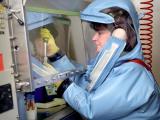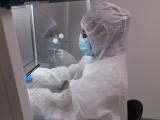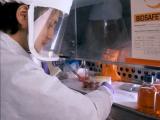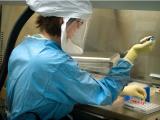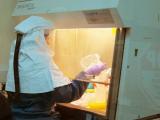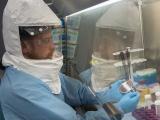Jun 24, 2004 (CIDRAP News) A substance that was smeared on dairy cows near Seattle, killing three and sickening seven others, was a chromium compound, but the episode did not endanger consumers, the Food and Drug Administration (FDA) said late yesterday.
The FDA called the substance "a strong oxidizing chromium compound" but did not identify it more specifically. Tests revealed "no identifiable risk from this agent associated with milk from any of the exposed cows," the agency said.
The FDA announced Jun 21 that it and several other agencies were investigating the incident at a dairy farm in Enumclaw, Wash., about 50 miles southeast of Seattle. Dairy farmer John Koopman reported that 10 cows got sick on Jun 6, and all had a reddish-black substance and blisters on their backs, according to stories this week in the Seattle Post-Intelligencer and the Seattle Times.
Three of the cows later died, and Koopman said he dumped thousands of pounds of milk as a precaution, according to reports. It wasn't clear exactly how many cows were exposed to the toxin, but the FDA said the number was fewer than 20.
The FDA said its Forensic Chemical Center in Cincinnati had been working on the case "around the clock" since Jun 20. The lab first analyzed residues of the substance found on the cows and identified it as a chromium compound.
A report by the Post-Intelligencer today quoted an unnamed federal investigator as saying the compound contained "chromium 6a known carcinogen with a variety of pharmaceutical and industrial uses." The story also quoted James Mayer, a University of Washington chemistry professor, as saying that chromium 6 compounds are "corrosive, aggressive chemicals" that are used in industry but not in any household products.
The FDA said it tested for chromium in milk from the sick cows, milk from cows that were exposed to the agent but didn't get sick, and milk from unexposed cows. "Concentrations of chromium in all samples of milk from dairy cattle directly exposed to and made ill by the toxic substance were well below the level of 100 parts per billion allowed for drinking water by the Environmental Protection Agency," the agency said.
"Chromium levels in all milk samples tested from the cows that came into contact with the toxic substance but did not become ill were below the minimum detection level of less than 1 part per billion," the statement said. In addition, the milk would have been diluted by a factor of 5,000 to 50,000 when mixed with milk from other farms before processing, officials said.
The FDA said no milk from the sick cows entered the food supply. Some milk from healthy animals in the herd was voluntarily held pending the test results, but FDA officials in Seattle yesterday were advising firms that they could release the milk, the agency said.
Koopman estimated that he had lost $17,000 to $20,000 since he discovered the toxin, according to the Post-Intelligencer story. He said the three cows that died were worth $2,000 each, and he was unable to sell at least 100,000 pounds of milk. The other seven cows have recovered but still weren't giving milk, he said.
In a Times story yesterday, Seattle FBI agent Patrick Adams was quoted as saying there was no evidence of any link to terrorism in the case. He said the agency was looking at former employees or anyone else who might have held a grudge against Koopman.
Newspaper reports said there was speculation that the episode could be linked to a recently resolved labor dispute between West Farm Foods, the marketing arm of the Northwest Dairy Association, and the Teamsters Union. Koopman is a member of the association's board. The lengthy dispute was settled May 26.
On May 4, vandals hit two trucking companies that haul milk for WestFarm Foods, according to a Post-Intelligencer report. The vandals opened valves and removed plastic covers on tanker trucks, resulting in the loss of 600,000 pounds of milk, and also punctured truck tires, the story said. A union official denied any knowledge of the attacks and said the union didn't condone them.
See also:
Jun 23 FDA news release
http://www.fda.gov/NewsEvents/Newsroom/PressAnnouncements/2004/ucm108315.htm
Jun 21 FDA news release
http://www.fda.gov/NewsEvents/Newsroom/PressAnnouncements/2004/ucm108313.htm


